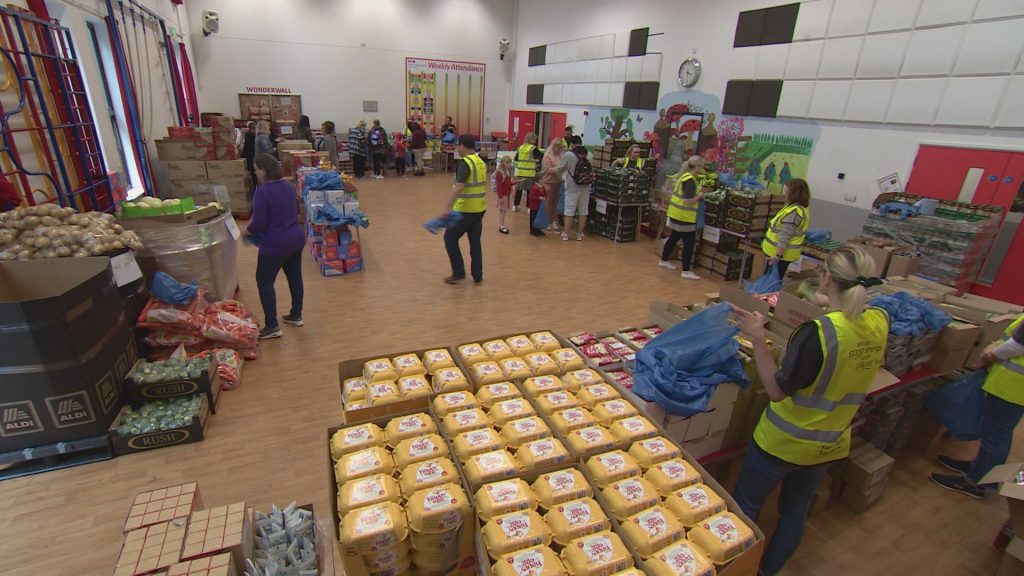A personal view by Gary Newby, News Editor, ITV News Central.
I watch in disbelief at the TV footage of dozens of families forming a queue which snakes around a building where free food is being made available to those in urgent need. But this isn’t the scene in some far away country hit by war, famine or natural disaster. This is Leicester.
This unfolding crisis has been caused by the rocketing rise in fuel, food and other living costs that has hit us all, but those on low incomes the hardest. It has plunged people already struggling into despair, unable to afford the very essentials to keep themselves and their children both fed and warm.

They number not a few, but potentially many given the statistics – one in three households in Leicester are in receipt of at least one state benefit, the rates of disposable income here are the second lowest in the country and 14,500 children in the city receive free school meals.
“How can it be that we’re seeing scenes like this here, in Leicester, in 2022,” a colleague asks as we watch the report compiled by one of our correspondents. A child who is interviewed says: “It does make us a bit scared because we don’t want our parents being worried and being upset and going through a lot.” It underlines that this is a crisis upon whose shoulders are not just parents to bear but impacts the well-being of children too and a cause of great anxiety for them.
Another contributor in the report said: “A lot of mums and dads are saying that they are going without themselves, they’re not eating to make sure their children are eating. They’re worried about what they can buy. They’re worried about when the next fuel bill comes in, how they’re going to pay it. It’s horrendous. Many, many people are on free school meals. They’re eligible for benefits but they’re in work. These people are mainly experiencing in-work poverty.”
Our report looked at a service launched to try to ensure that children didn’t go hungry during a recent half-term holiday when benefits-related free school meals wouldn’t be available to them. Leicester City Council had teamed up with a retailer and food manufacturer to provide eligible families with free surplus fruit, vegetables, milk, bread, and other store-cupboard essentials.

Other help is at hand. At the time of writing, the government had announced £15billion of support to help struggling households with changes to the National Insurance threshold, extra payments for those in receipt of Universal Credit, Tax Credit, Winter Fuel Payment and disability benefits, and one-off payments towards household electricity bills.
Signposting viewers to sources of information, advice and support is key to our coverage which also recently featured the impact of the rises in the price of petrol and diesel – to new record levels – on individuals, families and organisations, including charities.
We’ve also seen how the huge leaps in the price of everyday essentials is squeezing the joy out of life for many people whether it’s retirements deferred, children’s hobbies under threat, holidays shelved and the pressure to work all hours to try to pay the bills.
One woman we interviewed had already cut back on all non-essentials and has family and friends to help her from time to time but her living costs keep going up. “The direct debit on my electric and gas is going up and I don’t know where I’m going to find the extra from,” she told us. “I’ve cut back on everything I could possibly cut back on.”
Over the next few months we’ll be examining many aspects of the Cost of Living Crisis and how it’s impacting life here in Leicester and across the East Midlands.
It’s also our responsibility to challenge decision-makers and law-makers and examine the extent to which central and local governments are responding to need and minimising the harshest impacts,
Our coverage will feature the work being done by our communities to help too. Leicester has a proud reputation of mobilising people to help those in need whether providing direct financial aid or other support such as food parcels and emergency accommodation within their particular communities or others. The need now to help our neighbours in this current crisis is perhaps the most pressing we’ve ever experienced.
For those engaged in the work of providing practical help to others in the months, and maybe years, ahead it will be a test of their resolve and resourcefulness. But it’s a challenge they have proven from previous endeavours that they are equipped to meet.
Through the dark times ahead there is an opportunity for charity and kindness to shine.



